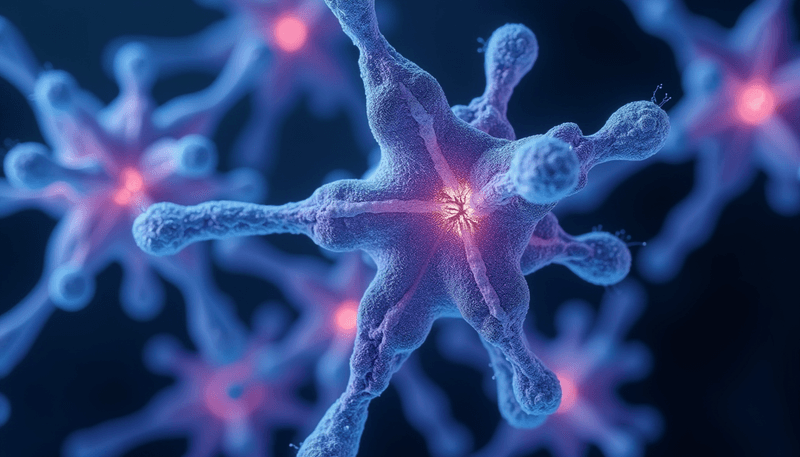New Hope for Hot Flash Relief

Picture yourself in an important meeting, feeling confident and focused, when suddenly it hits - that all-too-familiar wave of intense heat spreading across your chest and face. Hot flashes affect one-third of women during menopause, yet surprisingly few seek treatment. Recent research published in the Journal of South Asian Federation of Obstetrics and Gynaecology reveals groundbreaking developments in managing these challenging symptoms.
Understanding Your Hot Flashes: More Than Just "Power Surges"
Think of your body's temperature control system like a sophisticated thermostat. During menopause, this thermostat becomes extra sensitive - similar to setting your home thermostat to trigger both heating and cooling with just a tiny temperature change. This happens because of changes in the brain's temperature control center, specifically in an area called the hypothalamus.
"Have you noticed specific triggers that set off your hot flashes? Understanding your personal patterns can be the first step toward better management."
The research shows that these episodes typically last 2-4 minutes and can occur as frequently as every hour. While some women experience them for about a year, others might have symptoms for a decade or longer. Factors like body weight, ethnicity, and lifestyle choices can influence both the frequency and intensity of hot flashes.
The Evolution of Hormone Therapy: Safer Than You Might Think
One of the most significant insights from the research challenges common misconceptions about hormone replacement therapy (HRT). For women under 60 who started menopause within the last decade, modern HRT options can be both safe and effective.
Think of HRT like replacing the oil in your car - it's about maintaining optimal function rather than fixing something that's broken. The key is personalization. Just as you wouldn't put the same oil in every vehicle, hormone therapy needs to be tailored to your specific needs.
"What concerns have held you back from discussing hormone therapy with your healthcare provider?"
Beyond Hormones: Innovative Solutions on the Horizon
The research highlights exciting new developments in non-hormonal treatments. One breakthrough involves medications that target specific brain receptors called neurokinin receptors. These new drugs, particularly one called fezolinetant, have shown promising results with up to 93% reduction in symptom severity after 12 weeks.
Consider these receptors like light switches in your brain - the new medications help adjust the brightness (temperature regulation) without affecting the entire electrical system (hormones). This approach offers hope for women who can't or prefer not to use hormone therapy.
Practical Lifestyle Strategies That Actually Work
While medical treatments advance, the research also validates several practical approaches:
- Temperature Management: Wear lightweight, layered clothing
- Environmental Control: Keep your bedroom cool at night (around 65°F/18°C)
- Trigger Avoidance: Monitor and minimize consumption of spicy foods, alcohol, and caffeine
- Mind-Body Techniques: Consider cognitive behavioral therapy or hypnosis, which have shown measurable benefits
"Small changes can make a big difference. Which of these strategies could you implement this week?"
The research particularly emphasizes the effectiveness of cognitive behavioral therapy, even when delivered through online platforms. This is like having a personal coach helping you rewire your response to hot flashes, making them more manageable even if they don't completely disappear.
In conclusion, whether you choose hormone therapy, emerging medications, or lifestyle modifications, new options are available for managing hot flashes effectively. The key is working with your healthcare provider to find the right combination for your specific situation.
Ready to take action? Start by keeping a hot flash diary for one week, noting triggers, duration, and intensity. This information will be invaluable when discussing treatment options with your healthcare provider. Share your experiences with other women - you might be surprised to find you're not alone in this journey.
"Your turn: Which aspect of hot flash management would you like to explore first? The new medications, hormone therapy, or lifestyle changes?"

Dr. Anya Sharma, MD
Dr. Anya Sharma is a board-certified gynecologist with over a decade of experience specializing in women's health and patient education. She graduated from Johns Hopkins School of Medicine and completed her residency in Obstetrics and Gynecology at a top hospital in New York City. With a passion for empowering women, Anya transitioned to content creation to provide accessible, evidence-based information on health topics relevant to mid-aged women. Her empathetic and pragmatic approach combines medical expertise with relatable insights, making her a trusted voice in the field.








